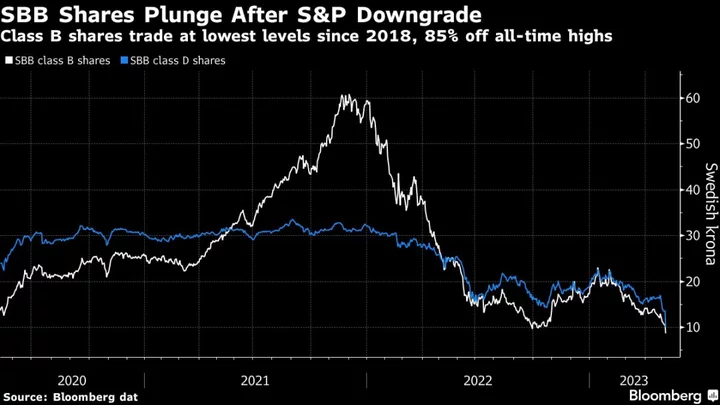One of Sweden’s biggest commercial landlords plans to halt payment of its dividend after suffering a ratings cut, in another sign the funding squeeze gripping Sweden’s leveraged property sector is worsening.
SBB — as Samhallsbyggnadsbolaget i Norden AB is more commonly known — is seeking to push back its dividend payment date until “at the latest” ahead of its 2024 annual general meeting. In a statement issued close to 11 p.m. local time, the Stockholm-based company said it will not carry out the issuance of 2.6 billion kronor ($260 million) worth of new class D shares and that it will continue to work on asset sales to strengthen its liquidity.
The moves come after the company earlier on Monday saw its credit rating cut to junk with a warning that a further downgrade is possible. SBB was lowered to BB+ and placed on negative outlook by S&P Global Ratings. The rating firm said it no longer believed the landlord could meet its thresholds for investment-grade debt metrics.
“The board of directors today announces that the announced rights issue will not be carried out due to the market reactions and the negative development of the SBB share price, which has made it impossible to carry out the rights issue at its announced terms,” the company said. It also proposed an extraordinary general meeting “in order to amend the dividend resolution such that the payment date for the dividend shall be able to be postponed by the board of directors.”
The recent developments raise serious questions for SBB as it grapples with $8.1 billion of debt. It’s also a blow for Chief Executive Officer Ilija Batljan, who has repeatedly assured investors he would take action to defend the company’s high-grade rating amid sharply rising interest rates and increasing investor angst over the sector.
Now the social housing landlord is faced with potentially higher borrowing costs as the new rating triggers so-called “step-up” coupons on existing debt while also the dimming the prospects for a successful rights issue, announced at the end of last month.
Swedish landlords such as SBB must roll over $40.8 billion of maturing bond debt over the next five years, a quarter of which falls due in 2023. They have been viewed as the canary in the coal mine for Europe’s property sector because much of that debt is short term and floating rate, making the debt piles particularly exposed to the interest rate environment.
With refinancing on the bond market too expensive, SBB has chosen to sell assets, raise bank loans and tap the stock market to get its debt metrics under control. At the end of April, the company announced plans to raise 2.6 billion kronor in new class D shares. However, its stock price was trading below the subscription price of 16 kronor per share even before Monday’s downgrade, making the offering less attractive for potential investors.
S&P said it could lower the rating on SBB further if the landlord is “unable to secure sufficient funding sources in the next couple of quarters to sustainably cover its short-term financial obligations,” according to a statement on Monday. “This could be due to failure to issue the planned equity of SEK2.637 billion, make additional sizable sales, and enhance its committed undrawn credit facilities.”
News of the rating action sent SBB’s Class B shares plunging 17% in Stockholm to the lowest level since 2018, and also dragged down Swedish peers Fastighets AB Balder and Castellum AB. The company’s euro bonds due 2027 — already trading at distressed levels — fell three-quarters of a point to 66.33 bid, according to data compiled by Bloomberg.
“While the downgrade itself wasn’t unexpected, the timing was,” Michael Johansson, a real estate analyst at Arctic Securities AS, said via phone. “I thought they would get more time as they have cut debt, sold assets and announced a rights issue — although one can question if they would have been able to carry it out.”
--With assistance from Love Liman, Christopher Jungstedt and Jonas Ekblom.
Author: Charles Daly, Anton Wilen and Divya Balji

